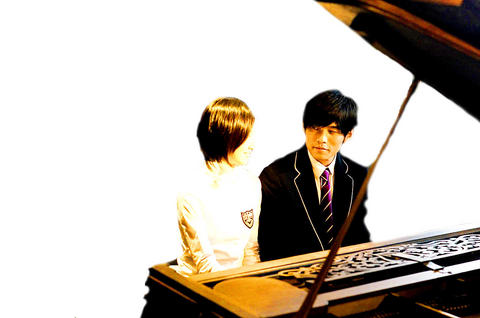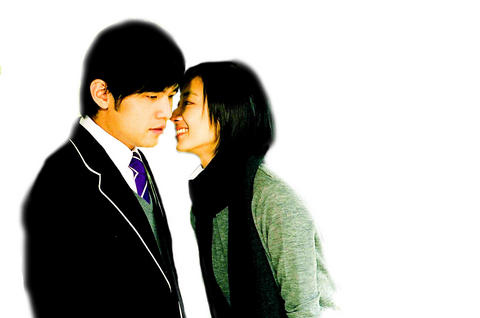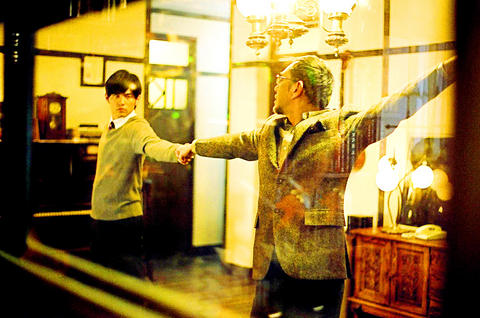Indisputably one of Mando-pop's biggest stars, Jay Chou's (周杰倫) previous forays into film were greeted with derision. His expressionless performances in Initial D (頭文字D) and Zhang Yimou's (張藝謀) Curse of the Golden Flower (滿城盡帶黃金甲) impressed few. With only a few music video-directing credits to his name, the 28-year-old pop star has made a daring move with his directorial debut Secret (不能說的祕密). The film turns out to be a surprisingly well-produced movie about puppy love that is guaranteed to be a hit with Chou's fans, high schoolers and like-minded grown-ups who have a taste for sugarcoated romance with a creative twist.
Chou stars as himself in the movie, a music major at Tamkang Secondary School (Chou's alma mater). On the first day of school, he is drawn to an old music room by a mysterious piano tune and meets Rain (played by Guey Lun-mei, 桂綸鎂), a fellow student with whom he grows romantically attached and with whom he shares many moments of affection.
A bright and enigmatic girl who attends classes only sporadically, Rain disappears from Jay's life one day without warning. The schoolboy's investigation leads to a trip down memory lane for his music teacher father (played by Anthony Wong).

PHOTOS: COURTESY OF SONY PICTURES
A secret is revealed and it's up to Jay to make a decision that will change everyone's life forever.
Credited as co-writer, director and actor for the movie, with help from internationally acclaimed cinematographer Lee Pin-bing (李屏賓), Chou should also be credited with creating a well-crafted story, smooth editing and an atmospheric production design that takes audiences into a fairy tale world of red-brick Japanese colonial architecture and beautiful boys and girls in British boarding school-style uniforms.
For sappy romantic movie fans, the first two-thirds of the film is a review of universalistic plot cliches: hanging out at a record store; bicycle rides beside fields; dancing; kissing; and lovey-dovey banter. All this soppiness could be seen as an innocent portrait of young love, but it may simply give members of the audience goose bumps.

The romantic story line is sometimes stretched too far and eats up most of the screen time leaving little space for full realization of the plot, which would be necessary for keeping viewers engaged and fascinated by the film's smart twist.
As the lead in his own movie, Chou is not in danger of being overshadowed by giants like Chow Yun-fat (周潤發) and Gong Li (鞏俐). He manages to show off the progress he has made in acting in the dramatic scenes with the well cast Guey, though the star's signature laconic drawl is still very evident. He also has a chance to show off his considerable musical talents in a piano duel scene that recalls the memorable scene in The Legend of 1900 starring Tim Roth.
The enjoyable on-screen chemistry between Chou and his cinematic father, Wong, creates quite a few gratifying and comic moments as the talented Hong Kong actor manages to play a supporting role without hogging all the attention. Though predictable and formulaic, the comic relief from the indispensable sidekicks played by members of Chou's pet project Nan Quan Mama (南拳媽媽) does work well most of the time in this secondary school-type love story.

Puporting to be nothing more than a puppy-love story, Secret proves to be a competent debut effort of a bright and resourceful star who understands the art of restraint well enough to hand in a neatly produced work.


April 28 to May 4 During the Japanese colonial era, a city’s “first” high school typically served Japanese students, while Taiwanese attended the “second” high school. Only in Taichung was this reversed. That’s because when Taichung First High School opened its doors on May 1, 1915 to serve Taiwanese students who were previously barred from secondary education, it was the only high school in town. Former principal Hideo Azukisawa threatened to quit when the government in 1922 attempted to transfer the “first” designation to a new local high school for Japanese students, leading to this unusual situation. Prior to the Taichung First

When the South Vietnamese capital of Saigon fell to the North Vietnamese forces 50 years ago this week, it prompted a mass exodus of some 2 million people — hundreds of thousands fleeing perilously on small boats across open water to escape the communist regime. Many ultimately settled in Southern California’s Orange County in an area now known as “Little Saigon,” not far from Marine Corps Base Camp Pendleton, where the first refugees were airlifted upon reaching the US. The diaspora now also has significant populations in Virginia, Texas and Washington state, as well as in countries including France and Australia.

On April 17, Chinese Nationalist Party (KMT) Chairman Eric Chu (朱立倫) launched a bold campaign to revive and revitalize the KMT base by calling for an impromptu rally at the Taipei prosecutor’s offices to protest recent arrests of KMT recall campaigners over allegations of forgery and fraud involving signatures of dead voters. The protest had no time to apply for permits and was illegal, but that played into the sense of opposition grievance at alleged weaponization of the judiciary by the Democratic Progressive Party (DPP) to “annihilate” the opposition parties. Blamed for faltering recall campaigns and faced with a KMT chair

Article 2 of the Additional Articles of the Constitution of the Republic of China (中華民國憲法增修條文) stipulates that upon a vote of no confidence in the premier, the president can dissolve the legislature within 10 days. If the legislature is dissolved, a new legislative election must be held within 60 days, and the legislators’ terms will then be reckoned from that election. Two weeks ago Taipei Mayor Chiang Wan-an (蔣萬安) of the Chinese Nationalist Party (KMT) proposed that the legislature hold a vote of no confidence in the premier and dare the president to dissolve the legislature. The legislature is currently controlled